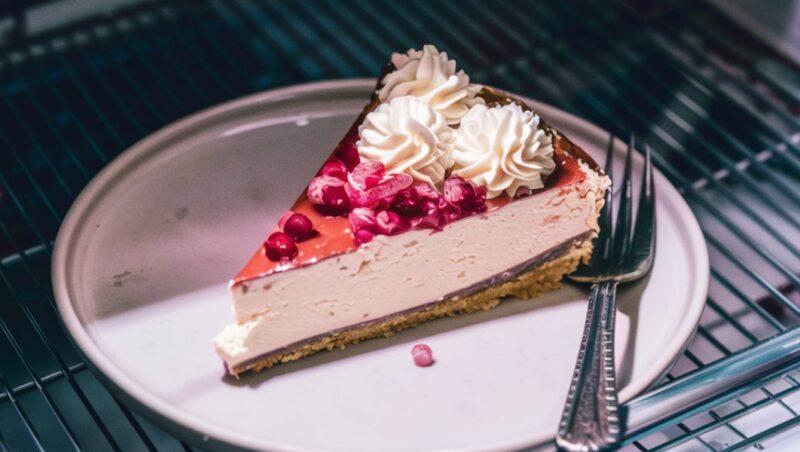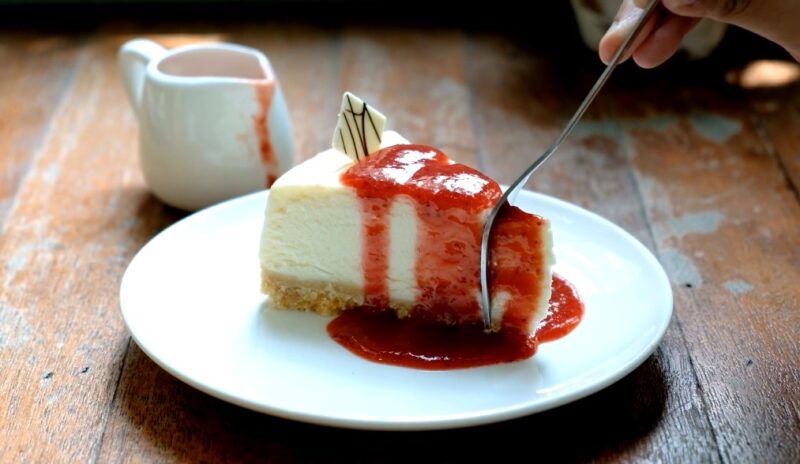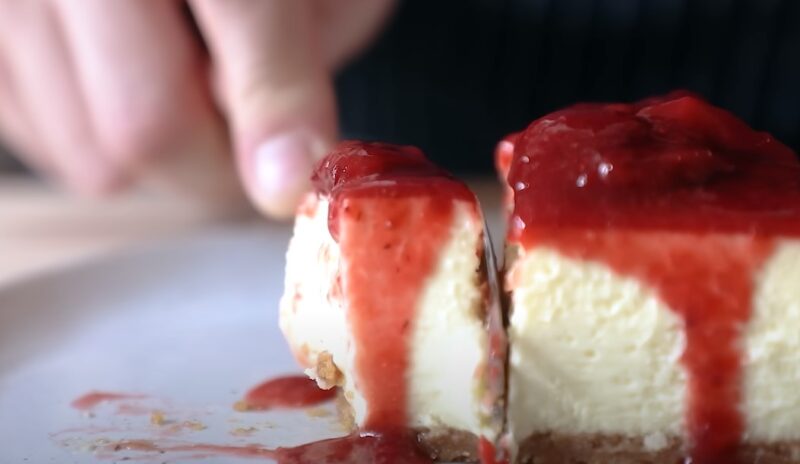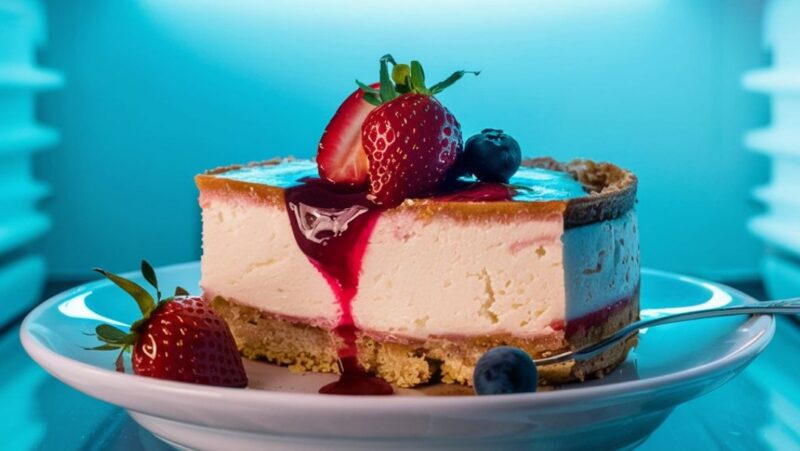Who doesn’t love the rich, creamy, and utterly indulgent experience of eating cheesecake? This dessert, known for its sweet flavor and surprisingly filling nature, is a favorite among many.
But what happens when you have leftovers, or you’ve prepared a large portion for a gathering? How do you store this delightful dessert, and more importantly, how long is cheesecake good for?
Key Takeaways
- Store-bought cheesecakes typically last 3 to 7 days in the fridge, while homemade cheesecakes should not be kept for more than 4 to 5 days. The exact time can vary based on ingredients and recipe.
- This cake should be refrigerated and covered to prevent it from absorbing odors or drying out.
- For best results, use a cake carrier, airtight containers, or wrap tightly in aluminum foil or plastic wrap.
- Spoiled cheesecake may show signs of mold, discoloration, or emit an unpleasant odor.
Shelf Life: Store-Bought vs. Homemade

The shelf life of cheesecake varies depending on whether it’s store-bought or homemade. Store-bought cheesecake typically lasts for 3 to 7 days in the fridge, depending on the preservatives used and the packaging method.
Homemade cake, on the other hand, should ideally not be kept refrigerated for more than 4 to 5 days due to the lack of preservatives and the freshness of the ingredients used. These durations can vary based on the specific ingredients and the recipe used, so it’s always best to err on the side of caution.
If you need to store the cake for a longer period, freezing is your best option. However, it’s important to note that the longer the cheesecake is stored, the more likely it is to experience changes in texture and flavor, so it’s best enjoyed sooner rather than later.
How to Store It?

The main ingredient in cheesecake is cream cheese, and sometimes cottage cheese or ricotta, which means it requires refrigeration to maintain its freshness and prevent bacterial growth.
- To prevent your cheesecake from absorbing odors from the fridge or drying out, it’s crucial to keep it covered.
- You can use a cake carrier, which is specifically designed for such desserts and provides a secure, airtight environment.
- Alternatively, cut the leftovers into smaller pieces and place them in airtight containers, which can help manage portion control and maintain freshness.
- Wrapping the cake with aluminum foil or plastic wrap is another effective method, ensuring that the wrap is tight enough to keep air out but not so tight that it damages the cake’s structure.
If your cheesecake has a topping that doesn’t fare well in the fridge, such as fresh fruit or whipped cream, it’s advisable to store the cake without the topping and add it just before serving. This ensures the topping remains fresh and doesn’t compromise the texture or taste of your cake.
Storing the toppings separately also prevents them from becoming soggy or losing their visual appeal. For best results, keep the toppings in their own airtight containers in the fridge and assemble the dessert just before it’s time to enjoy it. This approach keeps both the cheesecake and its toppings in optimal condition.
Can You Freeze Cheesecake?
Yes, you can freeze cheesecake, and it’s a great way to extend its shelf life beyond the few days it keeps fresh in the fridge. This cake freezes quite well, especially the denser varieties without sensitive toppings, such as fresh fruits or gelatin-based layers.
Before freezing, ensure the cake is cooled completely to prevent condensation from forming, which can lead to ice crystals and freezer burn. When freezing, wrap the cake with something freezer-safe, like an airtight container, freezer bag, or a double layer of aluminum foil, to prevent it from drying out or suffering from freezer burn.
Make sure to label the container with the date of freezing, as this will help you keep track of how long the cheesecake has been stored. Thaw the cake in the fridge the night before you plan to serve it, ensuring a gradual defrosting process that maintains its texture and flavor.
And if you’ve thawed the cake in the fridge, you can refreeze it if necessary, although it’s best to avoid multiple freeze-thaw cycles to preserve quality.
How to Spot a Spoiled Cake?

Signs like mold, discolorations, or an unpleasant odor are clear indicators that your cheesecake has gone bad and should not be consumed. These signs can result from improper storage, such as leaving the cheesecake out at room temperature for too long or not sealing it properly in the fridge.
If your cheesecake has been stored for longer than the recommended time—5 to 7 days for homemade and 7 to 9 days for store-bought—it’s safer to discard it, even if it appears fine, as harmful bacteria may not always be visible or detectable by smell.
When examining your cheesecake for spoilage, also pay attention to the texture and overall appearance. If the cheesecake appears overly soggy, has developed a strange color, or has an off-putting texture, it’s best to throw it away.
Additionally, if the cheesecake was left out at room temperature for more than two hours, it should be discarded, as this can lead to bacterial growth.
FAQs
Can I use regular plastic containers to store cheesecake in the fridge?
Yes, you can, but make sure they are airtight to prevent the cheesecake from absorbing fridge odors and to maintain its moisture. With other treats such as cupcakes, story is a bit different.
How long should I wait before covering a freshly baked cheesecake to put it in the fridge?
Wait until the cheesecake has completely cooled to room temperature before covering and placing it in the fridge. This usually takes about 2 to 3 hours. Covering it too soon can lead to condensation, which might make the top soggy.
Can I decorate my cheesecake with fresh fruit before freezing it?
It’s best not to decorate your cake with fresh fruit before freezing, as the fruit may become mushy and waterlogged upon thawing. Instead, add fresh fruit or other sensitive toppings just before serving.
Is there a difference in shelf life between a baked and a no-bake cheesecake?
Yes, typically, no-bake cheesecakes have a shorter shelf life than baked ones due to the presence of raw ingredients. No-bake cheesecakes should generally be consumed within 3 to 4 days.
How can I tell if my cheesecake is set and ready to refrigerate after baking?
A baked cheesecake is ready to refrigerate when the edges are set but the center is still slightly wobbly. This usually takes about 1 to 2 hours after removing it from the oven. Let it cool gradually before refrigerating.
The Bottom Line
By following these guidelines, you can enjoy your cheesecake to the fullest without compromising on taste or health. When in doubt, it’s better to err on the side of caution and discard any cheesecake that might have gone bad.
